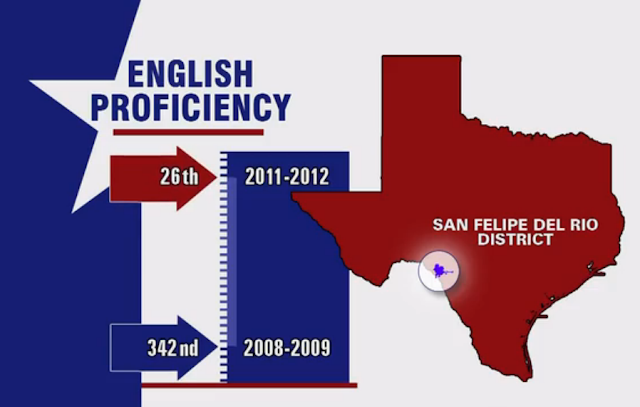"Should Spanish-Speaking Students Be Taught in English Only?"
This is the title of a report from the Public Broadcasting Service (PBS) aired on 18 July 2013. It is about a school district in New Britain, Connecticut. Most of the students in this district have Spanish as their mother tongue. Currently, only one in four students in the district can read proficiently at the end of third grade. One of the major problems the schools face in New Britain is absenteeism starting in kindergarten. Out of 1000 students, about 300 have missed at least 18 days during the school year. Among these students who miss kindergarten often, more than eighty percent are behind reading by the time they reach third grade. Home visits reduce the rate of absenteeism from 30 percent down to 18 percent, but test scores in reading are still far below satisfactory. A large majority (about 85 percent) of the students whose mother tongue is Spanish are still failing Connecticut's reading test. The new superintendent, Kelt Cooper, is working on changing this by implementing the English Language Development (ELD) method. Apparently, in Texas, Cooper had some success. The school district in Texas Cooper supervised rose from near the bottom in English proficiency scores in the state to near the top:
The PBS video also provides time to the opposing side - and cites that at the same time San Felipe del Rio district was improving its English scores, their math and science scores were falling down. Aram Ayalon, a member of the New Britain school board, was quoted, "When you spend so much time on grammar, I think it kind of reduces education and it reduces kids' motivation to learn. The bottom line is that it's doomed from the beginning."
What I find quite amazing within the video is a segment where PBS reporter John Tulenko was testing whether the children were in fact learning proper English via the ELD method. The following is the transcript of the segment (which starts at about 7:50):
"The proof is in the pudding...." The following is the entire video.
 |
| Captured from PBS video "Should Spanish-Speaking Students Be Taught in English Only?" |
The PBS video also provides time to the opposing side - and cites that at the same time San Felipe del Rio district was improving its English scores, their math and science scores were falling down. Aram Ayalon, a member of the New Britain school board, was quoted, "When you spend so much time on grammar, I think it kind of reduces education and it reduces kids' motivation to learn. The bottom line is that it's doomed from the beginning."
What I find quite amazing within the video is a segment where PBS reporter John Tulenko was testing whether the children were in fact learning proper English via the ELD method. The following is the transcript of the segment (which starts at about 7:50):
JOHN TULENKO: Though it had been less than a year, was the approach working?
Boys and girls, I'm going to write some sentences on the board.
I asked these second-grade English-language learners to fix them.
The kittens was cute.
Young man in the back right over there.
STUDENT: The "was" needs to change to "were."
JOHN TULENKO: Excellent.
Next, a little harder.
Yesterday, the dog Brown come to town.
OK, Elian.
STUDENT: Brown needs to go before dog.
STUDENT: Because the adjectives come first.
JOHN TULENKO: Ah, OK.
STUDENT: And come needs to be changed to came.
JOHN TULENKO: And why is that?
STUDENT: Because come is that you're coming right now. If it was past, it needs to be came.
JOHN TULENKO: That's exactly right. That's exactly right.
KELT COOPER: The proof is in the pudding. It's very clear that the ones that have gone through these programs have a better articulation of the English language, better understanding of the English language, understand the grammar rules and are much more proficient in English than their native English counterparts in the mainstream.
"The proof is in the pudding...." The following is the entire video.
Watch Should Spanish-Speaking Students Be Taught in English Only? on PBS. See more from PBS NewsHour.
Comments
Post a Comment